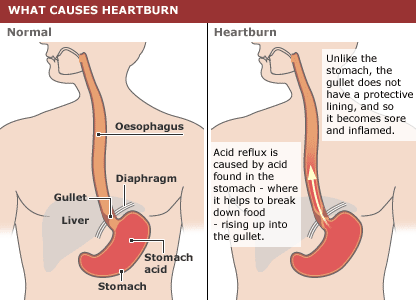
Acid reflux disease
- In adults and children, irritating acidic juices may back up from the stomach into the oesophagus and throat
- This is frequently called gastro oesophageal reflux disease or GORD
- This may occur at any time but happens more often when lying down
- Hiatus hernia is a common medical condition that predisposes people to acid reflux
- The most commonly recognised symptom of acid reflux is “heartburn” due to irritation of the lining of the oesophagus
Laryngopharyngeal reflux
- Most people do not know that acid reflux can also cause problems in the larynx (voice box) or the pharynx (throat)
- This can happen to someone even if they are not aware of any heartburn, and is sometimes called silent reflux or laryngopharyngeal reflux
Symptoms of acid reflux
- Hoarseness
- Excessive mucous or phlegm
- Throat clearing – acid reflux throat
- A sensation of a lump in the throat
- Sore throat
- Choking episodes
- Wheezing
- A sense of post-nasal drip
Reflux symptoms in children
- In children the symptoms can be a little different and may include:
- persistent vomiting
- bleeding from the oesophagus
- respiratory problems
- choking episodes
- recurrent pneumonia
- asthma
- problems with eating and drinking
- anaemia
- In some children unexplained fussiness and crying is due to acid reflux
Complications of acid reflux
- In a small percentage of people, more serious problems are associated with reflux, including pneumonia, ulcers of the larynx, vocal cord scarring, or a pouch of the upper oesophagus
- There is also a small chance of developing cancer in the oesophagus or throat due to long-term reflux that is not managed effectively
Acid reflux remedies
- This information is intended to help you understand acid reflux and the steps you can take to address this problem
- It is important to realise, however, that the healing of the irritated larynx, pharynx and oesophagus will take time
Acid reflux diet
- Dietary factors often contribute to acid reflux
- Certain foods are acids or irritants themselves, others will bring on acid production by the stomach
- The following list contains types of foods that are known to be especially troublesome:
- Caffeinated beverages, Coffee, Tea
- Chocolate
- Carbonated beverages
- Alcoholic beverages
- Citrus drinks
- Highly spiced foods
Acid reflux cause
- Being overweight contributes to acid reflux – if you are overweight it would help to lose weight
- Large meals at one time are troublesome, so three or four smaller meals are preferable to one or two large meals
- It is preferable to not eat for two or three hours before bedtime and it is advisable not to lie down right after eating
Behavioural and other factors
- As mentioned body weight is a significant factor in promoting the reflux of stomach acid and weight reduction is helpful
- Pregnancy will markedly increase the reflux symptoms of heartburn and sometimes throat symptoms – this is partly due to pressure on the stomach by the space taken up by the growing infant
- It is preferable to avoid clothing that fits tightly across the midsection of the body
- Good posture can make a difference – avoid slumping when sitting down and avoid bending or stooping
- For many people reflux occurs most often at night and sets up the irritation that continues to bother during the daytime – one of the most important things you can do is to sleep on a bed that is elevated at the head end
Avoid medications that worsen acid reflux
- Several different medications that you might be taking for medical problems may actually increase stomach acid
- These include:
- progesterone (Provera and other birth control pills)
- anticholinergics (Scopolamine, Probanthine and others)
- beta-blockers (Atenolol, Metoprolol, Propranolol and others)
- dopamine
- calcium channel blockers (Cardizem, Diltiazem and others)
- Aspirin or aspirin-containing compounds and other drugs used for pain – especially non-steroidal anti-inflammatory drugs or NSAIDs are especially prone to aggravating this problem
- Vitamin C is also an acid and can cause reflux and stomach problems
Medications to treat reflux
In addition to dietary and behavioural adjustments, medications are often part of an anti-reflux program. Some are available without a prescription, while others require a prescription.
- Antacids are commonly used and work by neutralising stomach acid
- Other medications work to decrease stomach acid secretion before it happens and are more effective at controlling symptoms
- Medications to treat reflux should be discussed with your doctor and will be prescribed as appropriate
Surgery
- In some patients with severe symptoms or complications of acid reflux, surgery can be performed for treatment
- If appropriate your doctor will discuss this option with you



